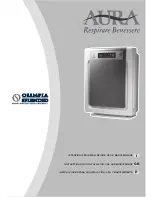
8 Commissioning
Installer and user reference guide
40
RXYTQ8~16U7YF
VRV IV+ heat pump for high ambient temperatures
4P561157-1 – 2018.09
8
Commissioning
8.1
Overview: Commissioning
After installation and once the field settings are defined, the installer
is obliged to verify correct operation. Therefore a test run MUST be
performed according to the procedures described below.
This chapter describes what you have to do and know to
commission the system after it is configured.
Commissioning typically consists of the following stages:
1
Checking the "Checklist before commissioning".
2
Performing a test run.
3
If necessary, correcting errors after abnormal completion of the
test run.
4
Operating the system.
8.2
Precautions when commissioning
DANGER: RISK OF ELECTROCUTION
DANGER: RISK OF BURNING
CAUTION
Do NOT perform the test operation while working on
the indoor units.
When performing the test operation, NOT only the outdoor
unit, but the connected indoor unit will operate as well.
Working on an indoor unit while performing a test operation
is dangerous.
CAUTION
Do NOT insert fingers, rods or other objects into the air
inlet or outlet. Do NOT remove the fan guard. When the
fan is rotating at high speed, it will cause injury.
INFORMATION
During the first running period of the unit, the required
power may be higher than stated on the nameplate of the
unit. This phenomenon is caused by the compressor, that
needs a continuous run time of 50 hours before reaching
smooth operation and stable power consumption.
NOTICE
Be sure to turn on the power 6 hours before operation in
order to have power running to the crankcase heater and
to protect the compressor.
During test operation, the outdoor unit and the indoor units will start
up. Make sure that the preparations of all indoor units are finished
(field piping, electrical wiring, air purge, ...). See installation manual
of the indoor units for details.
8.3
Checklist before commissioning
After the installation of the unit, first check the following items. Once
all below checks are fulfilled, the unit MUST be closed, ONLY then
can the unit be powered up.
You read the complete installation and operation
instructions, as described in the
installer and user
reference guide
.
Installation
Check that the unit is properly installed, to avoid abnormal
noises and vibrations when starting up the unit.
Field wiring
Be sure that the field wiring has been carried out
according to the instructions described in the chapter
"6.8 Connecting the electrical wiring" on page 29
,
according to the wiring diagrams and according to the
applicable legislation.
Power supply voltage
Check the power supply voltage on the local supply panel.
The voltage MUST correspond to the voltage on the
identification label of the unit.
Earth wiring
Be sure that the earth wires have been connected
properly and that the earth terminals are tightened.
Insulation test of the main power circuit
Using a megatester for 500 V, check that the insulation
resistance of 2 MΩ or more is attained by applying a
voltage of 500 V DC between power terminals and earth.
NEVER use the megatester for the transmission wiring.
Fuses, circuit breakers, or protection devices
Check that the fuses, circuit breakers, or the locally
installed protection devices are of the size and type
specified
in
the
chapter
. Be sure that neither a fuse nor
a protection device has been bypassed.
Internal wiring
Visually check the electrical component box and the
inside of the unit for loose connections or damaged
electrical components.
Pipe size and pipe insulation
Be sure that correct pipe sizes are installed and that the
insulation work is properly executed.
Stop valves
Be sure that the stop valves are open on both liquid and
gas side.
Damaged equipment
Check the inside of the unit on damaged components or
squeezed pipes.
Refrigerant leak
Check the inside of the unit on refrigerant leakage. If there
is a refrigerant leak, try to repair the leak. If the repair is
unsuccessful, call your local dealer. Do not touch any
refrigerant which has leaked out from refrigerant piping
connections. This may result in frostbite.
Oil leak
Check the compressor for oil leakage. If there is an oil
leak, try to repair the leak. If the repairing is unsuccessful,
call your local dealer.
Air inlet/outlet
Check that the air inlet and outlet of the unit is NOT
obstructed by paper sheets, cardboard, or any other
material.
Additional refrigerant charge
The amount of refrigerant to be added to the unit shall be
written on the included "Added refrigerant" plate and
attached to the rear side of the front cover.
Installation date and field setting
Be sure to keep record of the installation date on the
sticker on the rear of the upper front panel according to
EN60335‑2‑40 and keep record of the contents of the field
setting(s).
















































